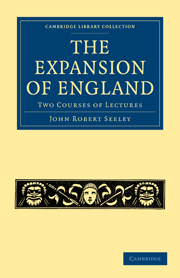Book contents
- Frontmatter
- PREFACE
- Contents
- COURSE I
- LECTURE I TENDENCY IN ENGLISH HISTORY
- LECTURE II ENGLAND IN THE EIGHTEENTH CENTURY
- LECTURE III THE EMPIRE
- LECTURE IV THE OLD COLONIAL SYSTEM
- LECTURE V EFFECT OF THE NEW WORLD ON THE OLD
- LECTURE VI COMMERCE AND WAR
- LECTURE VII PHASES OF EXPANSION
- LECTURE VIII SCHISM IN GREATER BRITAIN
- COURSE II
LECTURE V - EFFECT OF THE NEW WORLD ON THE OLD
Published online by Cambridge University Press: 05 August 2011
- Frontmatter
- PREFACE
- Contents
- COURSE I
- LECTURE I TENDENCY IN ENGLISH HISTORY
- LECTURE II ENGLAND IN THE EIGHTEENTH CENTURY
- LECTURE III THE EMPIRE
- LECTURE IV THE OLD COLONIAL SYSTEM
- LECTURE V EFFECT OF THE NEW WORLD ON THE OLD
- LECTURE VI COMMERCE AND WAR
- LECTURE VII PHASES OF EXPANSION
- LECTURE VIII SCHISM IN GREATER BRITAIN
- COURSE II
Summary
In a former lecture I pointed out how much unity is given to the history of England in the eighteenth century, how all the great wars of that time are shown to belong together and fall into a connected series, if you remark the single fact that Greater Britain during that period was establishing itself in opposition to Greater France. And I have since proceeded further in the same train of reflexion by remarking that during the eighteenth and seventeenth centuries it is not England and France only that have great colonies but Spain, Portugal and Holland also. You will, I think, find it very helpful in studying the history of those two centuries always to bear in mind that throughout most of that period the five states of Western Europe all alike are not properly European states but worldstates, and that they debate continually among themselves a mighty question, which is not European at all and which the student with his eye fixed on Europe is too apt to disregard, namely the question of the possession of the New World.
This obvious fact sufficiently borne in mind gives much unity to the political history of those nations and reduces to a simple formula most of their wars and alliances. But I now proceed to show, especially with respect to England, that the European States were greatly modified, not only in their mutual dealings with each other, but internally in the nature of each community, by their connexion with the New World.
- Type
- Chapter
- Information
- The Expansion of EnglandTwo Courses of Lectures, pp. 77 - 97Publisher: Cambridge University PressPrint publication year: 2010First published in: 1883

